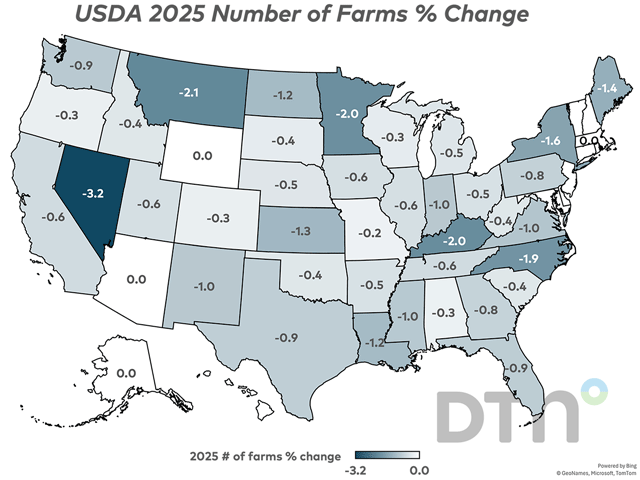DTN Oil
Oil Futures Drop Back as Colonial Makes Deliveries
CRANBURY, N.J. (DTN) -- Oil futures nearest delivery on the New York Mercantile Exchange and the Brent crude contract on the Intercontinental Exchange sold off Thursday, accelerating overnight selling this afternoon as the Colonial Pipeline began making deliveries along its 5,500 mile pipeline network following a five-day closure in response to a cyberattack on May 7.
"By midday today, we project that each market we service will be receiving product from our system," said the pipeline operator Thursday morning following the pipeline's restart Wednesday afternoon.
Colonial Pipeline provided a map of its system showing nearly all of the pipeline operational, while Line 4, a 504,000 barrels-per-day (bpd) mixed-product pipeline originating at the Greensboro tank farm in North Carolina and traveling north to the Dorsey tank farm in Maryland, was expected to be operational at noon New York time. So were line spurs to Baltimore, Maryland, and Birmingham, Alabama.
P[L1] D[0x0] M[300x250] OOP[F] ADUNIT[] T[]
Colonial earlier this week said, working with refiners, they had 2 million barrels (bbl) of refined product for the 2.5 million bpd pipeline system ready to go when operations were restarted. Still, some distributors along the pipeline were waiting for their loads Thursday afternoon, suggesting supply tightness will continue in some locales.
President Joe Biden took to the airwaves during the lunch hour, telling Americans it will take until the weekend to ease gasoline shortages that have sprung up across the U.S. Southeast, helping to drive the retail price of gasoline above $3 gallon this week, the first time the U.S. average has topped the psychological benchmark since crude was trading at $100 bbl seven years ago.
Biden had no comment on a Bloomberg report that the Colonial Pipeline company paid $5 million in ransom. On Monday, the Federal Bureau of Investigation identified the ransomware used in the Colonial Pipeline cyberattack was developed by DarkSide, a criminal organization believed to be located in eastern Europe.
Fanned by social media and television talking heads, motorists ignored calls for calm and instead lined up at gasoline stations to fill their tanks, with the panic buying stretching beyond regions served by the Colonial Pipeline, which originates in Houston and runs north to an end-point in Linden, New Jersey. Reports suggest more than 15,000 gas stations ran out of gasoline. As of 1 p.m. EDT, GasBuddy, which became the most downloaded app from Apple this week, said 73% of gas stations in Washington, D.C., were out of gas, and 48% in Georgia, while the 68.3% of stations with no fuel in the Atlanta metro area was an improvement from the 73.4% at the peak. In North Carolina, 68% of gas stations had no fuel, 52% were gasless in South Carolina and Virginia, while in Maryland, Tennessee and Florida, the percentage of stations without gasoline was in the low 30% range.
Panic buying clearly worsened a problem that was seen by seasoned market followers as transitory once convinced operators of the Colonial Pipeline were able to shut the pipeline down safely, doing so to avoid having the cyberattack penetrate deeper throughout its network. In physical cash markets, gasoline basis in the New York Harbor spot market weakened Thursday while mixed in the Gulf Coast.
Bank of America Global Research noted the patience of Gulf Coast refiners in response to the pipeline outage, with run cuts made by Total at its 225,500 bpd Port Arthur refinery, and Motiva at its 607,000 bpd Port Arthur refinery, and by Citgo at its 418,000 bpd Lake Charles refinery in Louisiana. The analysts also noted Valero, Marathon, and Phillips 66 leased vessels ostensibly to hold refined fuel while the pipeline was shut.
At settlement, NYMEX June RBOB futures were down 6.57 cents from a three-year high settlement on the spot continuation chart at $2.0953 gallon, while June ULSD futures slid 6.86 cents from Wednesday's 20-month spot high settlement to $2.0009 gallon. Both June WTI futures and ICE Brent futures fell from two-month high spot settlements reached Wednesday, down $2.26 to $63.82 bbl, and $2.27 to $67.05 bbl, respectively.
A stronger U.S. Dollar Index, albeit gaining modestly on the session, also added pressure, with strength in the currency following a greater-than-expected increase in consumer prices in April that fanned worry over inflation. The U.S. Bureau of Labor Statistics reported the consumer price index jumped 0.8% in April compared with a consensus by economists for a 0.2% increase, lifting year-on-year headline inflation to 4.2% -- the largest 12-month increase since September 2008. That raised worry the Federal Reserve's guidance that it would maintain interest rates near zero for an extended period of time is in jeopardy, prompting a selloff in equities Wednesday. The U.S. Dollar Index reversed off Tuesday's 89.955 11-week low to settle at 90.735.
Brian L. Milne can be reached at brian.milne@dtn.com





